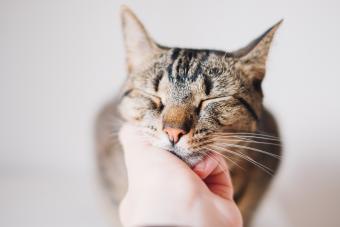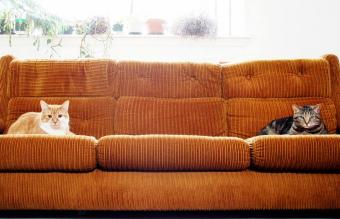
It can be difficult to know what to do when your cat brings in a mouse, bird, chipmunk, or other small animal. After all, your feline friend is trying to give you a gift, but it can be hard to know how to politely accept this favor while still disposing of the poor, unlucky creature. Understanding the gifting behavior and its purpose is a good starting point.
Understanding Cat Gift Behavior
When a cat doesn't have kittens, you become a member of their family, and therefore they want to bring you food. This behavior goes back to a cat's instinct of taking care of their own -- they hunt for you because you don't hunt.
What your cat brings home can vary widely, depending on where you live. If you live in an apartment, they may catch flies or bugs. If you live in a house in a city, they might bring you a grasshopper or a spider from the yard. And if you are in the country, you can see many varied things, such as bugs, birds, rodents, and even snakes.
The most important thing to remember is why your pet does this. They have accepted you as a member of their family and are treating you as such. Your cat is trying to prove that they're a great hunter, and they love you so much that they want to share what they've caught with you. For your cat, this is the ultimate devotion they can show a fellow creature.
If your cat brings you animals that are not quite dead, they could be attempting to use this as a teaching aid to help you develop your hunting skills. Take this as another kind gesture on their part.
How to Handle Gruesome Gifts
So, what should you do if you receive one of these generous tokens of appreciation? The last thing you want to do is scream and yell at your cat, although that may be your first instinct. They won't understand why you are so upset or that this behavior is a problem.
- Try to remain calm and avoid making a horrified face, as cats can read body language. Thank your feline friend for the gift, and if they will let you, dispose of it.
- If your cat won't drop their prey, you can offer them an alternative. Try a special toy, catnip, or a treat. If you can gain the help of another person, you can try to distract your cat with the alternative gift, and have the other person retrieve the hunting prize while the cat is not looking.
- Be sure to use gloves and a mask when handling the dead animal, as you could be at risk for disease transmission. Viruses can aerosolize, which is why respiratory protection is critical.
- When disposing of the mouse, or whatever they've brought you, don't bury it, because your cat or wildlife will just dig it up. Try to dispose of it in an outside garbage can with a tight-fitting lid.
- Finally, monitor your cat for any symptoms of illness over the following several days. See your veterinarian if your cat exhibits any vomiting, diarrhea, inappetence, or lethargy.
Consequences of Domestic Feline Hunting
Even if you're not squeamish, constantly receiving these gifts from your cat can become tiresome. There are other consequences you should be aware of.
Local Wildlife Threat
Domesticated cats have a significant negative impact on local wildlife. Data suggests that cats decimate 10 times more prey than wild predators in any given location. Because pets don't venture far from their homes, they target wildlife in a concentrated area. Some experts believe that this could result in shifts in natural biodiversity.
Disease Transmission
Most rodents and birds possess parasites that can make your cat very sick. If they consume any of the prey, they can easily become infected with roundworms, toxoplasmosis, or tapeworms. Small animals containing toxic levels of rodenticide are also a concern.
Even if your cat doesn't actually eat any of the dead animals, they're still at risk for diseases. Fleas or ticks residing on rodents can carry plague, tularemia, or hantavirus. If your cat isn't on monthly parasite prevention, these bugs can bite your cat and transmit harmful diseases. Many of these illnesses are zoonotic and can therefore be transferred to humans.
Tips to Prevent Your Cat From Killing Small Animals
Given the dangers these gifts can pose to the local wildlife, your cat, and your clean home, you're likely on the hunt for solutions. A few simple methods can help reduce your cat's kill rate.

- Offer toy alternatives. Toys that simulate mice or other prey could give your cat the satisfaction of the kill without leaving you to clean up the mess -- these work with some cats, but not all.
- Wear a bell. The jingling of a bell on your cat's collar can warn small animals of their arrival, helping them flee before your cat has a chance to pounce. Reflective or brightly colored collars may also help. A specially designed bird-safe collar was even created for this purpose.

- Increase stimulation. Aside from fulfilling an evolutionary urge, cats also hunt out of boredom. Try providing your cat with interactive toys or simply play with them more. If they're mentally stimulated, they may not feel the need to hunt.
- Feed them more protein. A study found that owners who switched their cat's food to a high-protein diet noted an average 36 percent decrease in gruesome gifts. This data could indicate that cats might also hunt due to dietary deficiencies. However, always check with your vet before changing your pet's diet.
- Keep them indoors. The only way to truly keep your cat from bringing home gifts is to keep them inside at all times. If this is not possible, you could consider building a catio or limit your cat to outdoor leash walks to ensure they don't run off and hunt.
Love Comes in Many Forms
After understanding why your cat brings you dead animals, you should feel genuinely loved. But for the safety of your pet and the ecosystem, discouraging this behavior may be the best thing for everyone.







